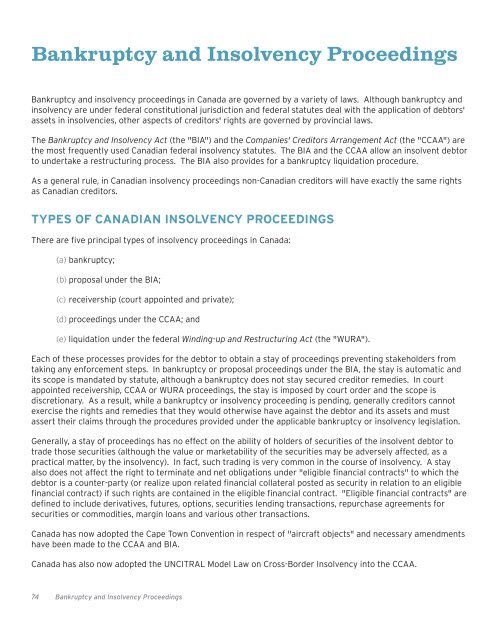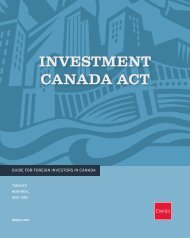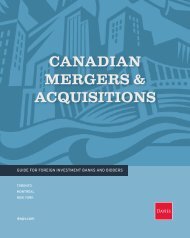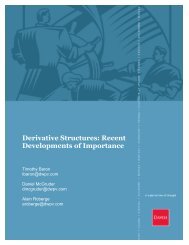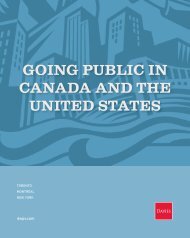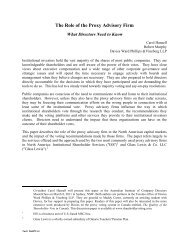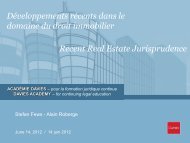Bankruptcy and Insolvency Proceed<strong>in</strong>gsBankruptcy and <strong>in</strong>solvency proceed<strong>in</strong>gs <strong>in</strong> Canada are governed by a variety of laws. Although bankruptcy and<strong>in</strong>solvency are under federal constitutional jurisdiction and federal statutes deal with the application of debtors'assets <strong>in</strong> <strong>in</strong>solvencies, other aspects of creditors' rights are governed by prov<strong>in</strong>cial laws.The Bankruptcy and Insolvency Act (the "BIA") and the Companies' Creditors Arrangement Act (the "CCAA") arethe most frequently used Canadian federal <strong>in</strong>solvency statutes. The BIA and the CCAA allow an <strong>in</strong>solvent debtorto undertake a restructur<strong>in</strong>g process. The BIA also provides for a bankruptcy liquidation procedure.As a general rule, <strong>in</strong> Canadian <strong>in</strong>solvency proceed<strong>in</strong>gs non-Canadian creditors will have exactly the same rightsas Canadian creditors.TYPES OF CANADIAN INSOLVENCY PROCEEDINGSThere are five pr<strong>in</strong>cipal types of <strong>in</strong>solvency proceed<strong>in</strong>gs <strong>in</strong> Canada:(a) bankruptcy;(b) proposal under the BIA;(c) receivership (court appo<strong>in</strong>ted and private);(d) proceed<strong>in</strong>gs under the CCAA; and(e) liquidation under the federal W<strong>in</strong>d<strong>in</strong>g-up and Restructur<strong>in</strong>g Act (the "WURA").Each of these processes provides for the debtor to obta<strong>in</strong> a stay of proceed<strong>in</strong>gs prevent<strong>in</strong>g stakeholders fromtak<strong>in</strong>g any enforcement steps. In bankruptcy or proposal proceed<strong>in</strong>gs under the BIA, the stay is automatic andits scope is mandated by statute, although a bankruptcy does not stay secured creditor remedies. In courtappo<strong>in</strong>ted receivership, CCAA or WURA proceed<strong>in</strong>gs, the stay is imposed by court order and the scope isdiscretionary. As a result, while a bankruptcy or <strong>in</strong>solvency proceed<strong>in</strong>g is pend<strong>in</strong>g, generally creditors cannotexercise the rights and remedies that they would otherwise have aga<strong>in</strong>st the debtor and its assets and mustassert their claims through the procedures provided under the applicable bankruptcy or <strong>in</strong>solvency legislation.Generally, a stay of proceed<strong>in</strong>gs has no effect on the ability of holders of securities of the <strong>in</strong>solvent debtor totrade those securities (although the value or marketability of the securities may be adversely affected, as apractical matter, by the <strong>in</strong>solvency). In fact, such trad<strong>in</strong>g is very common <strong>in</strong> the course of <strong>in</strong>solvency. A stayalso does not affect the right to term<strong>in</strong>ate and net obligations under "eligible f<strong>in</strong>ancial contracts" to which thedebtor is a counter-party (or realize upon related f<strong>in</strong>ancial collateral posted as security <strong>in</strong> relation to an eligiblef<strong>in</strong>ancial contract) if such rights are conta<strong>in</strong>ed <strong>in</strong> the eligible f<strong>in</strong>ancial contract. "Eligible f<strong>in</strong>ancial contracts" aredef<strong>in</strong>ed to <strong>in</strong>clude derivatives, futures, options, securities lend<strong>in</strong>g transactions, repurchase agreements forsecurities or commodities, marg<strong>in</strong> loans and various other transactions.Canada has now adopted the Cape Town Convention <strong>in</strong> respect of "aircraft objects" and necessary amendmentshave been made to the CCAA and BIA.Canada has also now adopted the UNCITRAL Model Law on Cross-Border Insolvency <strong>in</strong>to the CCAA.74 Bankruptcy and Insolvency Proceed<strong>in</strong>gs
BANKRUPTCYBankruptcy results <strong>in</strong> the liquidation of an <strong>in</strong>solvent entity either voluntarily or <strong>in</strong>voluntarily. It can be <strong>in</strong>itiatedeither by the debtor itself or by its creditors. Upon an assignment <strong>in</strong>to bankruptcy or the issuance of abankruptcy order, all of the property, assets and undertak<strong>in</strong>g of the bankrupt (subject to the <strong>in</strong>terests of securedcreditors) vest <strong>in</strong> a bankruptcy trustee for the general benefit of creditors.Thereafter, the bankruptcy trustee will realize aga<strong>in</strong>st any unsecured assets. The proceeds will be distributed, <strong>in</strong>accordance with the detailed rules set out <strong>in</strong> the BIA, to the unsecured creditors that have proven claims on apro rata basis, subject to the payment of certa<strong>in</strong> Crown claims, statutorily mandated preferred claims andsecured claims. Other than statutory rights of redemption by the bankruptcy trustee, bankruptcy does notaffect the rights of secured creditors or <strong>in</strong>volve secured assets. Bankruptcy proceed<strong>in</strong>gs are not available tobanks, <strong>in</strong>surance companies, loan companies, trust companies and authorized foreign banks.BANKRUPTCY PROPOSALAn <strong>in</strong>solvent debtor may also restructure its affairs to avoid liquidation or seizure through the consensualcompromise of creditors' claims. This is referred to <strong>in</strong> the BIA as a proposal. However, because of the strictstatutory code and time frame govern<strong>in</strong>g proposals <strong>in</strong> the BIA, the most significant and complex Canadian<strong>in</strong>solvency restructur<strong>in</strong>gs are not carried out as proposals to creditors under the BIA. If the restructur<strong>in</strong>grequires a sophisticated remedy that is not available under the BIA, for <strong>in</strong>stance, if the debtor needs to ma<strong>in</strong>ta<strong>in</strong>un<strong>in</strong>terrupted supply from critical suppliers who have no contract with the debtor, or if the restructur<strong>in</strong>g processwill take longer than six months, the CCAA is typically the legislative framework used.A restructur<strong>in</strong>g by way of proposal to creditors under the BIA is generally commenced by the fil<strong>in</strong>g of a notice of<strong>in</strong>tention to make a proposal that triggers a stay of proceed<strong>in</strong>gs. From the <strong>in</strong>itial fil<strong>in</strong>g until the end of theprocess, a licensed trustee must have agreed to act <strong>in</strong> connection with the proposal. The BIA specifies that aproposal must be filed with<strong>in</strong> six months of the beg<strong>in</strong>n<strong>in</strong>g of the process. A proposal under the BIA may bemade to creditors generally, or the creditors may be separated <strong>in</strong>to classes, based on commonality of <strong>in</strong>terest. ABIA proposal may also be made to secured creditors. A BIA proposal is only deemed accepted if all classes ofcreditors vote <strong>in</strong> favour of the proposal by a majority <strong>in</strong> number and two-thirds <strong>in</strong> value of the creditors vot<strong>in</strong>g <strong>in</strong>each class. In addition, the proposal is subject to the court's approval.Failure of a debtor to obta<strong>in</strong> the requisite approval of creditors, or the court's refusal to approve the proposal,will result <strong>in</strong> automatic bankruptcy. Banks, <strong>in</strong>surance companies, loan companies, trust companies andauthorized foreign banks cannot make bankruptcy proposals.RECEIVERSHIPReceivers may be appo<strong>in</strong>ted privately or by a court. Receivers will realize aga<strong>in</strong>st the property, assets andundertak<strong>in</strong>g of the debtor and will distribute the proceeds <strong>in</strong> accordance with the relative priorities of thedebtor's creditors. In addition, receivers may be appo<strong>in</strong>ted as receiver and manager with the authority tooperate the debtor's <strong>bus<strong>in</strong>ess</strong> as a go<strong>in</strong>g concern, or simply as a supervisor. The remedies available will vary <strong>in</strong>accordance with prov<strong>in</strong>cial laws.In the context of a private receivership, secured creditors may exercise certa<strong>in</strong> contractual or statutoryremedies to appo<strong>in</strong>t a receiver over the property, assets and undertak<strong>in</strong>g of a default<strong>in</strong>g debtor. In that case,the receiver is appo<strong>in</strong>ted pursuant to a contractual power granted by the debtor to the creditor <strong>in</strong> the securitydocument. Ten days prior to the receiver's appo<strong>in</strong>tment, the secured creditor must give a statutory notice of<strong>in</strong>tention to enforce its security to the debtor.A court-appo<strong>in</strong>ted receiver is an agent neither of the debtor nor of any creditors. As an officer of the court, ithas some duties and obligations <strong>in</strong> addition to those specified <strong>in</strong> the appo<strong>in</strong>tment order. Its powers arespecifically def<strong>in</strong>ed <strong>in</strong> the appo<strong>in</strong>t<strong>in</strong>g order. In certa<strong>in</strong> circumstances, the BIA also gives the court the power toBankruptcy and Insolvency Proceed<strong>in</strong>gs 75
- Page 1 and 2:
DOING BUSINESSIN CANADAYOUR COMPLET
- Page 3 and 4:
ONTENTSTABLE OF CONTENTSINTRODUCTIO
- Page 5 and 6:
IntroductionPOLITICAL AND CONSTITUT
- Page 7 and 8:
5RealEstateIndustrial and Intellect
- Page 9 and 10:
accordance with directions from the
- Page 11 and 12:
TITLE INSURANCE, TITLE OPINIONS AND
- Page 13 and 14:
11EnvironmentalLawIndustrial and In
- Page 15 and 16:
commercial activities, or carrying
- Page 17 and 18:
The federal government currently re
- Page 19 and 20:
17Types ofBusiness OrganizationIndu
- Page 21 and 22:
provincial law cannot do so as of r
- Page 23 and 24: partnership, limited partners’ li
- Page 25 and 26: parties. In Québec, joint venturer
- Page 27 and 28: 25Financing aBusiness OperationIndu
- Page 29 and 30: The Civil Code of Québec provides
- Page 31 and 32: 29CorporateGovernanceIndustrial and
- Page 33 and 34: Instrument 58-101. The practices re
- Page 35 and 36: 33CompetitionLawIndustrial and Inte
- Page 37 and 38: BID-RIGGINGBid rigging is any agree
- Page 39 and 40: anticompetitive agreements among co
- Page 41 and 42: 39ForeignInvestmentIndustrial and I
- Page 43 and 44: apply for Canadian citizenship. (Pe
- Page 45 and 46: (D)GENERAL REVIEW THRESHOLDSThe fol
- Page 47 and 48: there be an "acquisition of control
- Page 49 and 50: Industrial and Intellectual Propert
- Page 51 and 52: to perform or cause them to be perf
- Page 53 and 54: Registration grants an exclusive ri
- Page 55 and 56: PIPEDA applies in all provinces of
- Page 57 and 58: Employment LawCanadian employment l
- Page 59 and 60: displacement, laying-off, suspensio
- Page 61 and 62: easonable cause to believe that the
- Page 63 and 64: 63Retirement Plans, EmployeeBenefit
- Page 65 and 66: • funding;• eligibility;• pen
- Page 67 and 68: 67Temporary Entry andPermanent Resi
- Page 69 and 70: INTERNATIONAL AGREEMENTSIn recent y
- Page 71 and 72: immigrant in another class, he or s
- Page 73: 73Bankruptcy andInsolvency Proceedi
- Page 77 and 78: INTERNATIONAL BANKRUPTCYASSETS LOCA
- Page 79 and 80: Tax ConsiderationsThis chapter prov
- Page 81 and 82: TAX REPORTINGAnnual Tax ReturnsCana
- Page 83 and 84: Québec has legislation that limits
- Page 85 and 86: Amendments, SIFTs and their unithol
- Page 87 and 88: Conversely, where a Canadian reside
- Page 89 and 90: A person, whether resident in Canad
- Page 91 and 92: APPENDIX I: CANADA’S IN FORCE TAX
- Page 93: TORONTODAVIES WARD PHILLIPS & VINEB


